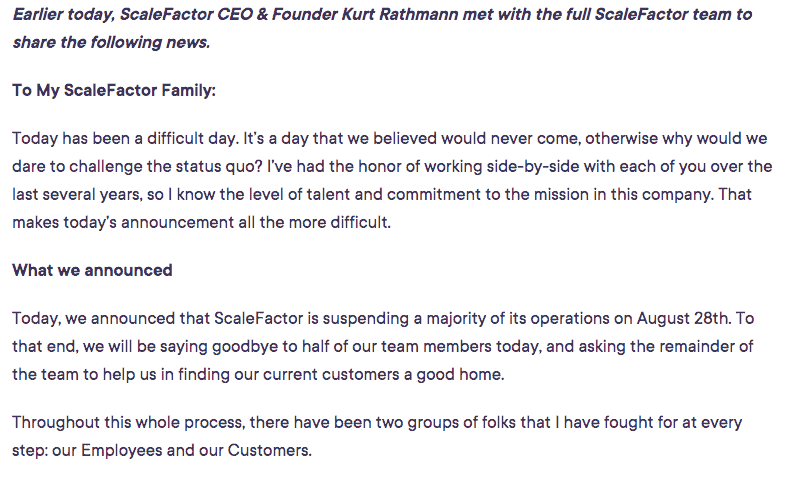Empower Bookkeepers? Or Replace Bookkeepers? This question has been discussed, argued and debated since automated accounting first became a topic.
There was unfortunately sad news in the accounting and bookkeeping space yesterday, when the CEO and founder of ScaleFactor, a technology aimed at automating the bookkeeping process, announced that ScaleFactor was shutting down.

Why ScaleFactor shutting down is sad but isn’t a surprise
This unfortunately doesn’t surprise the DOKKA team. Bookkeepers and accountants, for many years, have been hearing how artificial intelligence, machine learning, technology, and innovation, will lead to the demise of the bookkeeping job title.
From the ScaleFactor website:
Manage your business’ accounting, tax, and finance in just a few minutes a week. ScaleFactor saves you time and money so you can focus on what you love.
DOKKA don’t believe this is the case.
Many startup’s and technology companies in the financial space believe that extraction of data from an invoice or document, using OCR, artificial intelligence, and machine learning, is all that is required for automation of the daily bookkeeping process.
Nothing can be further from the truth.
From working with thousands of bookkeepers over the last few years, we have realized that the extraction of data from a financial document, although extremely challenging and hard to get right, is only a small part of the process that is required to automate accounting. Extracting the dates and amounts and descriptions and other relevant information out of the financial documents, and putting them into fields which can then be used, does not create the right bookkeeping entry.

A bookkeeping entry consists of many different factors, and each bookkeeper will have different requirements for how the bookkeeping entry gets created. On a simplistic level, the same purchase from the same vendor can be allocated by the same bookkeeper to different general ledger accounts for different businesses. There are many different ways of creating a bookkeeping entry, and extracting the data does not result in the correct entry, that the bookkeeper, or more specifically the business owner requires for their individual business circumstance.
At DOKKA, we have realized that the learning that the bookkeeper applies to the bookkeeping entry is a crucial part of creating the bookkeeping entry. So many of our competitors require a bookkeeper to setup complicated rules and procedures upfront, and then to maintain those rules. The more rules, the harder it gets to maintain.
Other companies offering automated bookkeeping entry creation send the documents over to countries where there is cheaper labor, so that real people are extracting the data. Putting the confidential data issues aside, and the fact that usually only one or two languages can be spoken by these people, so it won’t offer a solution for all documentation, it means that there is no learning. Everytime the document is sent, the person extracts the data manually, and the pre-defined rules start applying.
Many of our competitors require a bookkeeper to setup complicated rules and procedures upfront
Let the bookkeeper train the technology
That is why we created the DOKKA drag-and-drop methodology which is constantly learning the requirements for the bookkeeper for that specific business, and is adapting accordingly. Rule creation results in errors. That is why we decided that DOKKA won’t work with rules. Our machine learning analyses the actual use by the bookkeeper or controller, and creates rules in the background automatically, which then change automatically when the bookkeepers require changes.
Bookkeepers do far more than create bookkeeping entries
However, even the bookkeeping entry itself is a small part of the work that a bookkeeper does on a daily basis.
If you think about it, and these are just some examples, a bookkeeper needs to:
- collect documents from the client, often in multiple ways such as emailing documents, uploading documents, scanning documents, or snapping pictures of the documents on a mobile phone. And even occasionally driving to the clients business to fetch a pile of paper documentation
- query on a regular basis the reason for why they’re receiving the specific documents
- Query on a regular basis what the numbers / figures / dates on the documents refer to
- discuss the documents with colleagues (and discuss other matters of the business with colleagues)
- be able to do a lot of additional work using these documents other than for the bookkeeping entry, such as creating a lot of additional reports
- reconcile these documents
- find specific documents which are needed for specific use cases later on.
- Create an approval process required on the documents before these documents are paid by either the business or the outsourced accountant or bookkeeper.

The bookkeeping process is far more complicated than data extraction from a document
This bookkeeping work for the client often takes FAR LONGER than extracting the relevant data from the document, and creating the bookkeeping entry in the accounting software.
It’s the bookkeeping process that is time consuming, and this process consists of hundreds of different micro processes, which are different for each business and bookkeeper.
We never like to see startup’s failing. But we believe that that startups in the accounting and bookkeeping space (and in the greater financial industry) that are focussing on technology to only extract data from documentation, or going a step further to create the bookkeeping entries, without empowering the bookkeeper to lead the process, will fail. Bookkeepers and accountants need to use their knowledge, experience, and requirements to satisfy the specific requirements of the business.
The automation of accounting will only go so far. The real power is to empower the bookkeeper and accountant to embrace the technology so that the software can learn what their requirements are on an ongoing basis, saving them time. This will allow the bookkeepers more time to focus on activities that will not be automated in the foreseeable future.
It’s hard work setting up a startup, and ScaleFactor did a fantastic job setting up a team, raising significant investment, and building a product that many businesses were using
But ScaleFactor ultimately failed.
At DOKKA we believe that the future of bookkeeping & accounting is empowering bookkeepers and accountants to use innovation, artificial intelligence, machine learning and technology, rather than using technology to replace bookkeepers and accountants.




